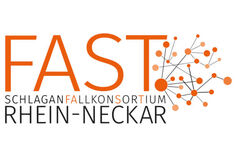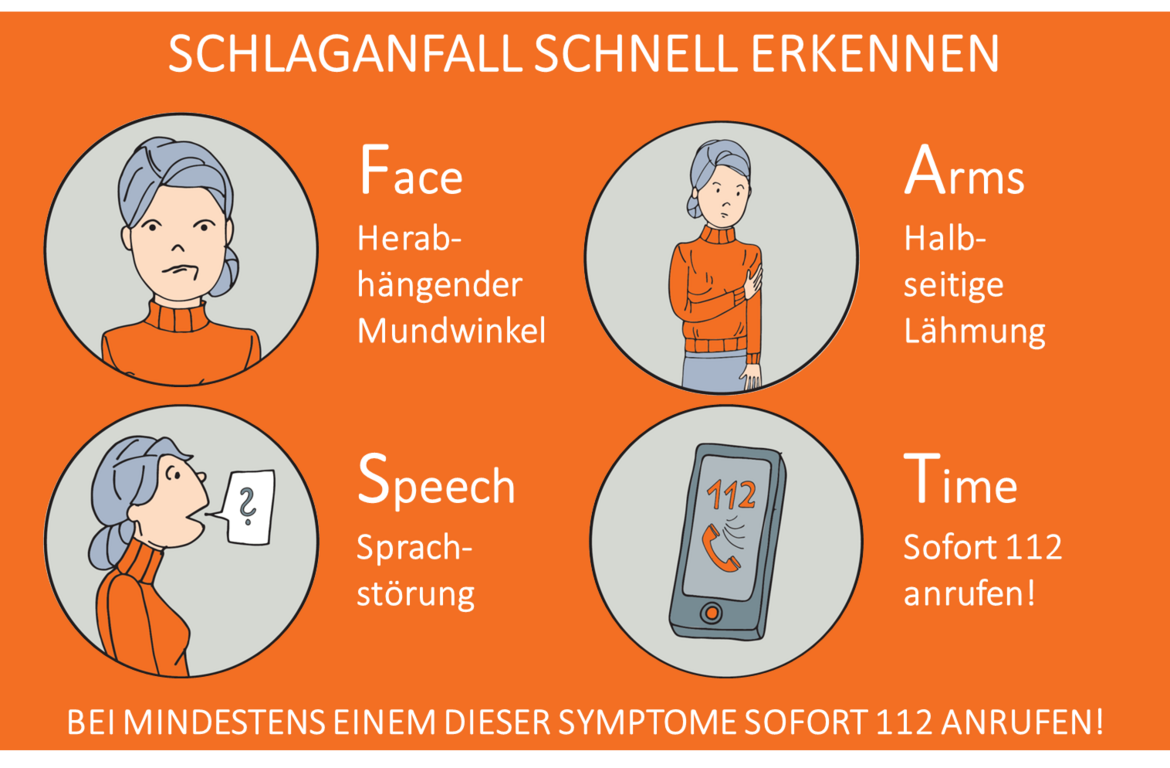Information on strokes
As a stroke is not accompanied by pain like a heart attack, valuable time is often lost between the event and transport to hospital.
Recognising a stroke quickly
The first signs of a stroke can be recognised with the F-A-S-T test:
- Face: Ask the person to smile. Can the person smile easily or, for example, does one corner of the mouth not move?
- Arms: Ask the person to raise both arms. Can the person move both arms without difficulty or does one arm move with difficulty or not at all? The same applies to the legs.
- Speech: Ask the person to say their name or birthday. Can the person answer without difficulty or does the person speak indistinctly or cannot find the right words?
- Time: If there are problems with one or more of these tasks, call 112 immediately. Every minute counts
Acute stroke care
You or one of your relatives may have been diagnosed with an acute ischaemic stroke. In this case, the blood flow to the nerve cells is interrupted or restricted due to a narrowing or blockage of arteries supplying the brain. As a result, the oxygen supply to the brain tissue is disrupted.
Thrombolytic therapy
Patients with this diagnosis are treated in accordance with current therapy recommendations. For many patients, this means that they are treated with so-called thrombolytic therapy . This is a highly blood-thinning treatment that uses medication to dissolve the blood clot (thrombus). This therapy can also be carried out safely in small, localised stroke treatment units.
Thrombectomy
Thrombectomy can be used in particular in the case of occlusions of larger vessels or if blood thinning with medication is not possible for medical reasons. In contrast to thrombolysis therapy, the blood clot is not dissolved but removed directly from the blood vessel using a catheter. Thrombectomies can only be performed at a few specialised centres.
Acute stroke care as part of FAST
In order to create the best possible conditions for the treatment of acute stroke for patients outside of the large stroke care centres, the Rhine-Neckar Stroke Consortium (FAST). The aim is to provide treatment locally as often as possible and centrally (i.e. in a specialised stroke centre) whenever necessary. This gives all acute stroke patients the opportunity to be professionally assessed to determine whether they are eligible for recanalisation therapy and whether this can be carried out promptly.
Self-help
Those affected, relatives, friends and interested parties are welcome to contact one of our partner organisations:
Stroke self-help group Heidelberg
Mrs Inge Leibold
Friedrichsfelder Str. 35
69123 Heidelberg
Tel.: 06221 836418
Self-help group Never give up - young people after a stroke e.V.
Mr Volker Frank
Breslauerstr. 31, 68526 Ladenburg
Tel: 06203 890851
eMail: nie.aufgeben(at)online.ms
www.alles-ist-anders.info
Stroke self-help group Sinsheim
Mr Leo Imhof
Beckenwiesenweg 24
74889 Sinsheim
Tel.: 07261 3395
eMail: imhof-leo(at)t-online.de
Heidelberg Stroke Network
The Heidelberg Stroke Network brings together clinics, therapeutic practices, self-help groups, health insurance companies, associations and the city of Heidelberg to support those affected and their relatives. The stroke network has produced a guide which contains further information on the following topics, among others:
- What is a stroke?
- Inpatient care
- Outpatient care
- Help in everyday life
- Counselling centres
- Prevention
You can download the network's stroke guide here . Further information can be found at
http://www.schlaganfall-netzwerk-heidelberg.de.
Public relations
Patient information
Fast station folders
As part of the FAST collaboration and studies, it was established that some patients and relatives do not feel sufficiently informed despite the information provided by staff. In particular, the reasons for transferring patients back to referring clinics lead to uncertainty and confusion for some patients and relatives. For this reason, we provide patients with a FAST information folder when they are admitted to the UKHD. This folder contains information about FAST, the UKHD Stroke Unit, the referring clinic and an explanation of the transfer back to the referring clinic. Other contents include an information sheet for relatives and information on self-help groups depending on the patient's place of residence. The aim is to make it clearer to patients and their relatives that they are being cared for within a network of cooperating centres. The folders were created by our two Quali FAST Master's students Melek Terzi and Franziska Herzog as part of their internship before starting their Master's thesis. The FAST ward folders will be handed out to patients from May 2019.
Scientific studies
We are conducting a registry study to assess the benefits of the FAST care network for those affected. This means that the (pseudonymised) data collected as part of the stroke treatment will be evaluated and reviewed. No additional experiments or treatments are carried out alongside the regular treatment. All clinics in the Rhine-Neckar Stroke Consortium are taking part in this study. In order to be statistically meaningful, this study will include all patients who have suffered an acute stroke.
As part of the study, we are investigating which factors influence the quality of stroke treatment. We are particularly interested in the time from the onset of stroke symptoms to the start of treatment, how this affects the success of treatment and whether the new structures set up as part of the network actually contribute to an improvement in the care of stroke patients.
Fast Patient Researcher
In March 2019, Mr Hans-Dieter Niepötter was recruited as a patient researcher to support scientific activities as part of the FAST studies. Mr Niepötter is the head of the Stroke Self-Help Group Bergstraße, which currently has around 40 members. Mr Niepötter will support the FAST team on a voluntary basis by helping us to better understand patient experiences and wishes and to incorporate aspects of stroke care relevant to those affected into research projects.
You can find more information about Mr Niepötter and the Stroke Self-Help Group Bergstraße here.
Call from affected parties
Have you suffered a stroke in the past? Are you interested in science and would you like to contribute to improving stroke care? Then get in touch with us. We are looking for Patient Researchers (m/f) to help us incorporate the patient perspective into our research. For example, you will help us to better understand patient experiences and wishes and to incorporate aspects of stroke care that are relevant to those affected.
For more information, please contact the care coordinator of the FAST Stroke Consortium.


